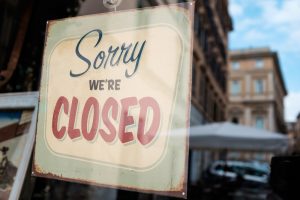
This situation could stem from a number of issues with your customer, including their business closing or even bankruptcy, which is something that makes it far more difficult for you to receive payment on time.
In instances such as this, you will need to know how you can go out and collect debt payments from a business that has closed down. The issue here is that this process is far more complicated than if you were to try and gain payment from an active venture or a financially healthy company.
Read on for all the information you need on collecting debt from a closed business.
What happens if a company goes bankrupt?
Bankruptcy isn’t a term that is used for businesses, but rather individuals. Insolvency is the word associated with companies. Many different factors can lead to a company becoming insolvent, which is when a business becomes unable to pay bills, or when the value of its assets become less than the value of the liabilities.
A common cause of insolvency is down to poor cash flow, stemming from overproduction or failure to receive payments on time.
There are a few stages to make yourself familiar with when a company goes through the insolvency process. First of all, the business must immediately cease all trading, and no further payments can be made. This is where businesses will seek out licensed insolvency practitioners and an exit strategy will be formed.
Next, the liquidation process takes place, which will always be overseen by the insolvency practitioner. Here, the practitioner will have a number of jobs to complete, which will include settling legal disputes, completing all paperwork, paying VAT bills, and selling company assets.
Payments will also be made to creditors, which is the part you need to make yourself concerned with, as it will be where you can collect money that is owed to you.
How to collect money from a closed business
The first thing you need to do is wait until the business officially becomes insolvent. During the liquidation game, the debt will be dealt with. If this is seemingly taking too long, you can file for a business to become bankrupt, which will award you with the cash that is owed to you more quickly if you are successful.
If you have used a debt factoring company to fund the invoice and their is an issue, claim on their debt protection insurance and inform the factoring company.
When the organisation has entered liquidation, how you approach debt collection will rely upon the particulars of your circumstance. Initially, the insolvent business will be compelled to sell their resources and this cash is imparted to potential creditors. Notwithstanding, there is a need list, which means you may not be preferred choice to get this instalment. Any expenses and charges for the liquidation are first paid, some potential creditors and those holding coasting charges over resources will then, at that point, be paid off. Following this, unstable creditors and investors are next.
To gather obligation from a closed business, you should enlist a case as a lender. You ought to be reached by the organisation’s indebtedness specialist who will demand you to do this. You should think about enrolling lawful assistance to manage this interaction, obviously this will eat into your inevitable result, and may not be awesome for more modest obligations.
Then again, for situations where you have paid for an item or administration and not got it, you can apply for chargeback from your bank or card supplier in the event that you paid utilising a Visa, or a section 75 case on the off chance that you paid utilising a Mastercard.
What is bad debt write off?
When a customer is unlikely to pay their debts off, it is referred to as ‘bad debt’. However, bad debt write off refers to something else. You need to deal with things in the right way once you find out that a customer or organisation appears to be unable to pay off their debts to you.
You should then record this debt as an expense which can be filed under an account that covers bad debt, and this can then be recorded in the profit and loss report. This will ensure that you are conducting the process officially and doing your part in the process of retrieving the money you are owed.
Seasoned professional with a strong passion for the world of business finance. With over twenty years of dedicated experience in the field, my journey into the world of business finance began with a relentless curiosity for understanding the intricate workings of financial systems.
